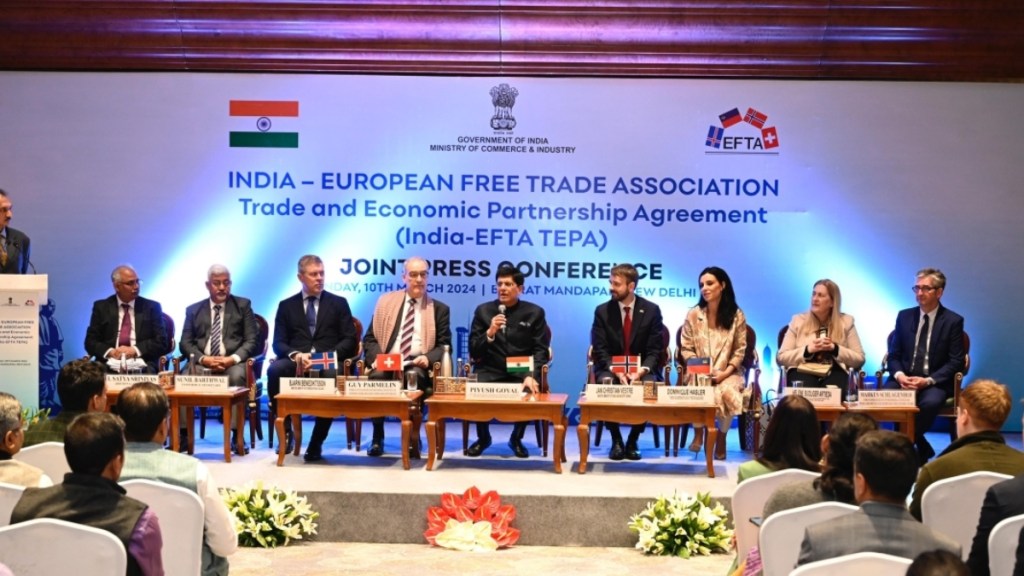India can exercise the option of withdrawing tariff concessions granted to the four-nation European Free Trade Association (EFTA) under the Trade and Economic Partnership Agreement (TEPA) in case of non-fulfillment of $100 billion investment obligation only after 18 years, and that too after a three-stage consultation process.
Though the investments have to flow in 15 years – $50 billion in the first 10 years and another $ 5 billion in next five – TEPA provides for a three-year grace period to EFTA, according to the agreement documents reviewed by FE.
The consultation procedure can be invoked by India if the investment target is not achieved in 15 years, but only after the grace period. Importantly, the suspension of concessions should follow the conclusion of the consultation process. The revocation of the duty reliefs has also to be “proportionate and temporary,” as per the documents, where “proportionate” is not defined.
The agreement indeed provides for a specially appointed sub-committee for a regular review of the progress on the investment front. The sub-committee will meet in every two years and may even invite private sector entities, international economic organisations, non-governmental organisations and other relevant stakeholders to assist.
No major tariff reduction for goods by the European side are built into the pact, as these countries – Switzerland, Norway, Iceland and Liechtenstein -already maintain very low tariffs. In India’s case, the tariff reductions to be offered are more material. All duty cuts would be carried out over a period of 10 years with different timelines for each category of goods. Yet, much before the 15-year window for EFTA to meet the investment commitments, India would have provided all duty concessions that it had agreed to under the TEPA.
Most of the tariff lines from both sides are included in the pact, while a few “sensitive” items like dairy, soya, coal and sensitive agricultural products are excluded.
To facilitate investments India will have to ensure a favourable investment climate while taking into account the need to identify, assess and mitigate potential risks for security or public order.
Only on coal – except steam and coking coal, medicines, dyes, most textiles and apparels, iron and steel products tariffs would come down to zero immediately.
Tariffs on watches, clocks, cocoa bean and powder, malt products, tuna, trout and olive oil would be brought down to zero in seven years. On chocolate products, coffee, olives, avocado, apricot and caramel the duties will take 10 years to come down to zero.
On a 750 ml bottle of wine costing less than $ 5 there will be no concession. The bottle costing between $5 to $15 duty will come down to 100% from 150 % in the first year. In 10th year duties will be brought down to 50% and stay there. In wines priced more than $15, duty in the first year will be down to 75% from 150% and then at 25% in the 10th year.
No duty concession has been given on Swiss gold, which accounts for 80% of total imports from Switzerland . The bound duty rates have been brought down to 39% from 40% in TEPA but effective rates in India are 15% so no relief there too.
The meeting of the sub-committee on investment promotion and cooperation will be held in conjunction with the meeting of the joint committee, that too will meet every two years. The TEPA also has the provision of review two years after its entry into force.
The joint committee will be the apex body to supervise and administer the TEPA and to oversee its further development. The joint committee, that will have representatives of both sides, will have the powers to modify identified annexes, appendices and articles of the Agreement


